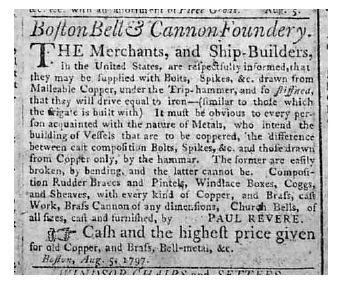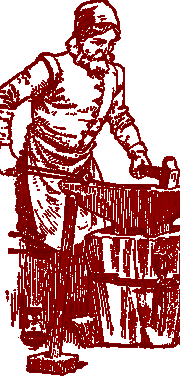 When the American colonists rose in revolt against the British in 1776,
they had many advantages, particularly the insulation from the motherland. Once
they had taken up arms, however, they found themselves severely hindered by
the over-reliance on British iron that had been imposed upon them as a colony. When
the Revolution started, there were small blacksmith’s forges in every
town, but only a very few operating iron furnaces to make the raw
pig iron from ore that the blacksmiths needed to forge swords, bayonets, and
guns, not to mention plows, hoes, axes and other domestic goods.
When the American colonists rose in revolt against the British in 1776,
they had many advantages, particularly the insulation from the motherland. Once
they had taken up arms, however, they found themselves severely hindered by
the over-reliance on British iron that had been imposed upon them as a colony. When
the Revolution started, there were small blacksmith’s forges in every
town, but only a very few operating iron furnaces to make the raw
pig iron from ore that the blacksmiths needed to forge swords, bayonets, and
guns, not to mention plows, hoes, axes and other domestic goods.

Ironworks and the Revolution
 When the American colonists rose in revolt against the British in 1776,
they had many advantages, particularly the insulation from the motherland. Once
they had taken up arms, however, they found themselves severely hindered by
the over-reliance on British iron that had been imposed upon them as a colony. When
the Revolution started, there were small blacksmith’s forges in every
town, but only a very few operating iron furnaces to make the raw
pig iron from ore that the blacksmiths needed to forge swords, bayonets, and
guns, not to mention plows, hoes, axes and other domestic goods.
When the American colonists rose in revolt against the British in 1776,
they had many advantages, particularly the insulation from the motherland. Once
they had taken up arms, however, they found themselves severely hindered by
the over-reliance on British iron that had been imposed upon them as a colony. When
the Revolution started, there were small blacksmith’s forges in every
town, but only a very few operating iron furnaces to make the raw
pig iron from ore that the blacksmiths needed to forge swords, bayonets, and
guns, not to mention plows, hoes, axes and other domestic goods.
The colonists turned rebels realized this. In April 1781 Joseph Mercer of
Fredericksburg, VA, wrote to Thomas Jefferson, then Governor of Virginia,
to send troops and secure his town from the British. His appeal, however,
centered specifically on Frederickburg’s iron foundry. He wrote:
… there is not in this State a place more deserving of public attention
than this Town and its appendage Mr. Hunter’s Iron Works – I am
sure I need not tell you that it is from Mr. Hunter’s Iron Works that
every Camp Kettle has been supplyed for the continental and all other Troops
employed in this State & to the Southward this year past – that
all the anchors for this State & Maryland & some for continent have
been procured from the same works; that without these works we have no other
resources for these articles, and that without the assistance of the Bar Iron
made there, even the planters hereabouts & to the Southward of this place
wou’d not be able to make Bread to eat – As to the Town itself
I need not inform you that the public manufactory of Arms is here – that
without it, all our Arms, however so little injured wou’d be useless
to us;….
If this state of facts is admitted, can it be doubted but that the Enemy will consider it as one of their first objects to deprive us of so many advantages to their prejudice – The Foundary was thought an object worthy their attention & this from information only – But now far more certain that this place will be thought so when Genl. Phillips has himself been an eye witness that there are such advantages here & has so often seen the conveniences drawn from this place by all our Troops both regulars & militia.
The importance of iron to the revolution cannot be understated. The rebels themselves needed iron for shot and for the cannon; they needed iron for swords and daggers and bayonets; iron made the guns and the carriages' parts; iron even made the humble horseshoes and boot nails ('hobnails') that got the troops to the battles. In effect, iron was an oft-forgotten
lifeline for the colonists. Ever since the British had restricted iron
manufacture in the colonies in 1750 (see related article), the colonists had
been hampered in that development, but as of 1776 there was every impetus
to develop more foundries and to enlarge those they had. It's worth remembering that Paul Revere was not just the silversmith as we idolize him; his brass foundry also cast cannon and military goods to order.
Sources:
“Fredericksburg in Revolutionary Days,” William & Mary Quarterly 27 (1918): 71-75 at p. 82.
Return to:
One-Minute Essays
 |
|

|